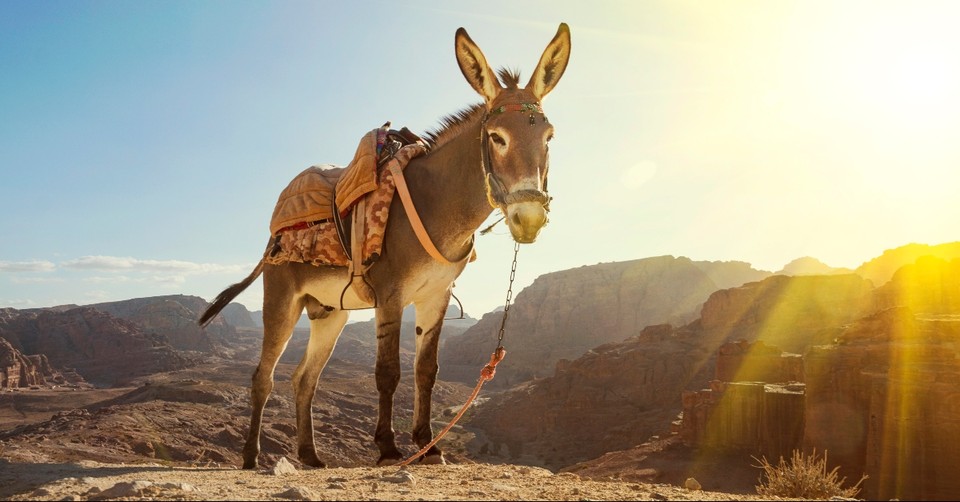Where Does the Bible Mention Donkeys?

I used to babysit for two little girls who lived next to a family who had goats and one donkey. The donkey was supposed to protect the goats from coyotes. Instead of a guard dog, they have a guard donkey which are often used to protect small farm animals. The girls and I used to love to say, “Ne-haw” and make the donkey sound. We read of some pretty unique encounters in Scripture with donkeys. As Palm Sunday approaches and maybe you, like I, are curious about where the Bible mentions donkeys?
Donkeys in the Old Testament:
Strong’s Concordance shares three different Hebrew words involving a donkey in the Old Testament:
ayir: Male donkey (Mentioned 9 times)
athon: Female donkey (Mentioned 34 times)
pere: A wild donkey (Mentioned 10 times)
One of the most well-known stories about a donkey in the Scriptures was when God enabled the prophet Balaam’s donkey to talk to him. This might sound like the craziest thing you’ve ever heard, but our God reigns over all and if He chose to open the mouth of a donkey to speak to Balaam, then He did what only He can do. In Numbers 22:22-34 we find the story of Balaam. As he begins to ride his donkey while two servants were with him, the angel of the Lord appeared before the road to stand against them. Only the donkey saw the angel. With much disobedience, the donkey fought back against Balaam’s lashes to continue forward. The donkey even went as far as crushing Balaam’s foot against a wall so they would not move toward the angel. Eventually, the donkey laid down so Balaam could not go anywhere.
Numbers 22:28 says, “Then the LORD opened the donkey’s mouth, and she said to Balaam, ‘What have I done to you that you have beaten me these three times?’”
Balaam says that he would kill the donkey if he had a sword and the donkey asked if he had ever treated her that way before after all their years together. Balaam said no and the Lord revealed that the donkey was right and the donkey saved Balaam’s life three times. Balaam has regret and apologizes.
First of all, it amazes me that Balaam just responds to the donkey, there is no mention of screaming or asking the donkey to repeat what she said. If many of us were in that situation, it would be easy to believe that it was a dream or that we had lost our minds. I love that God used a donkey as a warning three times to tell Balaam that he was headed for destruction. It reminds me that our great Lord can work in amazing ways to warn us of our sin and show us protection.
Donkeys are mentioned in the livestock for Abraham (Genesis 12:16), for Isaac (Genesis 24:35) and for Jacob (Genesis 30:43). The angel of the Lord told Hagar that her son Ishmael would be like a wild donkey. (Genesis 16:12)
A significant mention of a donkey is seen when Abraham rides a donkey to go and sacrifice his son Isaac. (Genesis 22) This act of riding the donkey is later seen by Jesus on His way to Jerusalem to be sacrificed on behalf of our sins. Jeremiah talks about wild donkeys as a metaphor for the people’s sin. (Jeremiah 14:6) Israel was compared to a wild donkey, chasing after other lovers. (Hosea 8:9)
Many of us think of horses as the primary mode of transportation before cars, however, donkeys were actually mentioned in the Bible for traveling. We see this as Joseph prepares for his brothers to leave Egypt on donkeys. (Genesis 42:25-27) We see this as Abigail rushes to speak with King David. (1 Samuel 25)
The Prophecy of Jesus on a Donkey:
In the book of Zechariah, there is a specific prophecy of the coming King. Zechariah 9:9-13 tells of the king of Jerusalem coming to them lowly on a donkey and a colt. Verse 9 says, “Rejoice greatly, Daughter Zion! Shout, Daughter Jerusalem! See, your king comes to you, righteous and victorious, lowly and riding on a donkey, on a colt, the foal of a donkey.” This is a direct word from God about Jesus’ entrance into Jerusalem on what we call Palm Sunday. The words of Zechariah are so precise to even include the colt as well as the donkey which Jesus rides. (Matthew 21:2-5)
Donkeys in the New Testament:
Strong's Greek shares three different Greek words involving a donkey in the New Testament:
Onos: a donkey (4 times in NT)
Onikos: of or for a donkey (2 times)
Luke 10 tells the story of the good Samaritan. Luke 10:34 describes the selfless act of the Samaritan who put the injured man on his donkey and took the man to an inn for rest and recovery. In this selfless act, the Samaritan uses his means of transportation to rescue and restore a man’s life. Maybe we do not have donkeys, but what has the Lord given to us that we too can use to help others?
2 Peter warns the people of God of false teachers. He uses Balaam as an example. He says that Balaam loved wickedness and was rebuked by a donkey who spoke with a human voice to spare the prophet. (2 Peter 2:15-16) This causes me to think about how God humbles the proud.
Matthew 21:1-11 and John 12:12-16 share about the fulfillment of the prophecy for Jesus our King to ride on a donkey. When we think about a king, we imagine him riding in on something powerful or eye catching. It is intriguing that Jesus chose to ride in on a donkey. This shows us that He was not coming in to win a man-made battle, but was humbly riding in obedience to His soon-to-be death on the cross for our sins. He was going not as the world envisioned, but as the Lord planned to defeat the enemy. John 12:16 reveals that Jesus’ disciples did not understand what he was doing until after He was glorified. They remembered the words of Zechariah and it clicked for them that Jesus fulfilled this prophecy.
There is another prophecy that is yet to be fulfilled about Jesus, our King returning to us. However, instead of a donkey, He will be riding a white horse. (Revelation 19:11-16)
Why Was a Donkey Significant?
When we ponder all the mentions of donkeys in Scripture, we see some primary purposes of donkeys were travel, protection for flocks (Or in Balaam’s case, protection of people), preparing the way for sacrifice, and humility.
There is a rare Jewish tradition still to this day where a donkey is “king for the day.”
Ron Ben-Tovim from Haaretz shares, “Pidiyon petter hamor: This Jewish ritual – whose name translates roughly to the “redemption of the first-born donkey,” and is mentioned in the Book of Exodus (13:13) – demands that the owner of a female donkey redeem her first offspring if it is male by means of a gift of a lamp to the kohen, or priest. This is a way, some traditions claim, of distinguishing the donkey from the other animals because of its important role in the Exodus from Egypt.”
As we ponder the thought of the donkey being a primary mode to escape from slavery and leading God’s people into the promised land, may it remind us of our freedom in Christ. Jesus rode on a donkey for us. He became sin for us so we could have His righteousness. (2 Corinthians. 5:21) He was not just “King for the day,” but He was and is and always will be our King of Kings and Lord of Lords.
Photo credit: iStock/Getty Images Plus/Diy13

Originally published March 29, 2022.




